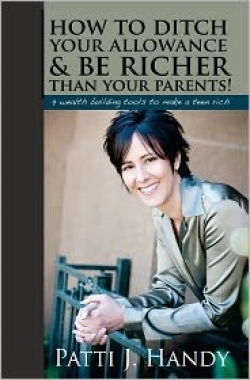How to Ditch Your Allowance & Be Richer than Your Parents
9 Wealth Building Tools to Make a Teen Rich
Parents and the school system often leave teens sorely unprepared for the financial realities of their future independent lives, rarely discussing the topic until unfortunate, and costly, mistakes have already been made. Author Patti J. Handy, a certified life coach with a background in banking and real estate, is a mother whose goal is to equip her own son and other children with the money management skills they need to enjoy a secure and prosperous financial life.
Written in a conversational style, Handy’s book offers information, encouragement, understanding, and just the right amount of teasing to take some of the edge off of a serious topic. Although some readers may not relate well to the author’s personal references to her son (parents may enjoy these more than teens), both adults and teens will benefit from the wealth of information she presents, from basic methods of keeping a checkbook balanced to choosing investments wisely. Teen readers will value the author’s explanation of credit cards, good and bad debt, credit scores, saving and investing, the wisdom of preparing for life’s large purchases, and the importance of giving one’s time and money to help others.
Handy’s discussion of classifying a proposed purchase as a “need” or a “want” is especially helpful, as the topic often results in generational conflict: Parents may have a longer-range view of the benefits of delayed gratification, while teens may feel that immediate possession of the item is necessary to their social standing. The author does a good job of showing how saving or investing one’s money, rather than spending it, is the wiser choice, and she does so with numbers that can inspire teens to take a more long-term approach to their finances. Having an author, rather than a parent, make this presentation provides the distance and objectivity necessary to avoid a heated, and unfruitful, discussion.
Although most of the advice Handy offers is sound, her recommendation that teens balance their checkbooks monthly might lead to problems for those who write checks frequently; weekly balancing would be more likely to help teens keep their spending under control and avoid fees and penalties.
The author has a healthy respect for entrepreneurship, and, as corporate employment is currently a much less secure option than it once was, her advice that teens ask themselves the question, “If I knew I couldn’t fail, what would I want to do?” would be well taken. Handy also tells readers that whether they are working for someone else, or starting their own enterprise, their talents, skills, and passions are best given to the thing that will bring them the most satisfaction—performing a “purposeful service” in the world.
Disclosure: This article is not an endorsement, but a review. The publisher of this book provided free copies of the book and paid a small fee to have their book reviewed by a professional reviewer. Foreword Reviews and Clarion Reviews make no guarantee that the publisher will receive a positive review. Foreword Magazine, Inc. is disclosing this in accordance with the Federal Trade Commission’s 16 CFR, Part 255.

